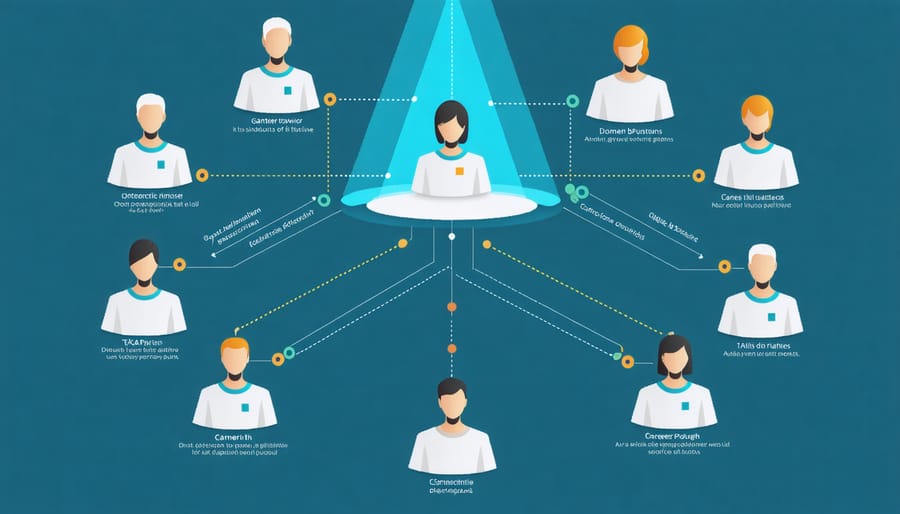Artificial Intelligence isn’t just reshaping technology—it’s creating unprecedented career opportunities for those willing to navigate its dynamic landscape. Building a successful AI career demands strategic planning, continuous learning, and adaptability in an ever-evolving field. Whether you’re a recent graduate, seasoned professional, or career switcher, the AI pathway offers multiple entry points and growth trajectories.
The journey into AI requires more than just technical expertise—it demands a blend of mathematical foundations, programming skills, and domain knowledge. Top companies like Google, Amazon, and Microsoft are actively seeking AI professionals who can bridge the gap between theoretical understanding and practical implementation. As AI systems become increasingly integrated into business operations, the demand for qualified professionals continues to outpace supply.
What sets successful AI practitioners apart isn’t just their technical prowess—it’s their ability to solve real-world problems, collaborate across disciplines, and stay ahead of industry trends. From machine learning engineers to AI researchers, data scientists to AI ethics specialists, the field offers diverse roles that cater to different skill sets and interests. By following a structured learning path and building a strong professional network, you can position yourself for long-term success in this transformative industry.
The Modern AI Career Landscape

Core AI Career Paths
The field of Artificial Intelligence offers diverse AI career opportunities and salaries that cater to different interests and skill sets. Three primary career paths stand out in this dynamic field: Machine Learning Engineer, AI Researcher, and Data Scientist.
Machine Learning Engineers focus on developing and deploying AI systems that can learn from data. They bridge the gap between theoretical AI concepts and practical applications, working with frameworks like TensorFlow and PyTorch to create scalable ML solutions. This role requires strong programming skills and a deep understanding of ML algorithms.
AI Researchers push the boundaries of what’s possible in artificial intelligence. They develop new algorithms, explore novel approaches to problem-solving, and contribute to the academic understanding of AI. This path typically requires advanced degrees and a passion for theoretical work, making it ideal for those interested in groundbreaking innovations.
Data Scientists, the third major path, combine statistics, programming, and domain expertise to extract meaningful insights from data. They work on problems ranging from predictive analytics to natural language processing, making this role perfect for those who enjoy both data analysis and practical problem-solving.
Each path offers unique challenges and rewards, with opportunities to specialize further as the field evolves. Success in any of these roles requires continuous learning, as AI technology advances rapidly and new tools emerge regularly.
Emerging AI Specializations
As AI technology continues to evolve, new specialized roles are emerging that bridge the gap between technical expertise and business needs. The AI Ethics Officer role has become increasingly crucial as organizations recognize the importance of AI ethics responsibilities in development and deployment. These professionals ensure AI systems are developed with fairness, transparency, and accountability, while also addressing potential biases and privacy concerns.
AI Product Managers represent another vital emerging role, combining technical understanding with product development expertise. They act as the bridge between technical teams and business stakeholders, translating complex AI capabilities into practical solutions that meet market needs. These specialists must understand both the technical limitations of AI systems and the business value they can deliver.
Other emerging specializations include AI Implementation Strategists, who focus on helping organizations integrate AI solutions effectively, and AI Training Specialists, who develop programs to help workforces adapt to AI technologies. Machine Learning Operations (MLOps) Engineers are also in high demand, ensuring the smooth deployment and maintenance of AI systems in production environments.
These roles often require a combination of technical knowledge, business acumen, and soft skills, making them attractive options for professionals looking to transition into AI without necessarily becoming deep learning specialists or data scientists.
Building Your AI Career Foundation
Technical Skills Blueprint
Building a successful career in AI requires mastering a specific set of essential AI technical skills that form the foundation of your expertise. At the core, proficiency in programming languages like Python and R is crucial, as these are the primary tools used in AI development. Mathematics and statistics knowledge, particularly in linear algebra, calculus, and probability theory, enables you to understand the underlying principles of AI algorithms.
Data science skills are equally important, including data preprocessing, visualization, and analysis. You should be comfortable working with popular frameworks and libraries such as TensorFlow, PyTorch, and scikit-learn, which are standard tools in AI development. Understanding machine learning concepts, including supervised and unsupervised learning, neural networks, and deep learning architectures, is fundamental.
Version control systems like Git, cloud computing platforms such as AWS or Google Cloud, and database management skills round out the technical requirements. Additionally, familiarity with big data technologies like Hadoop and Spark can give you an edge in handling large-scale AI applications.
Remember that these skills aren’t just theoretical – they need to be applied practically through projects and real-world applications. Start with small projects and gradually work your way up to more complex implementations as your expertise grows.

Essential Soft Skills
While technical expertise is crucial in AI, success in the field equally depends on well-developed soft skills. Effective communication stands out as particularly vital, as AI professionals must explain complex concepts to stakeholders from diverse backgrounds, from business executives to end users. You’ll need to articulate technical solutions in clear, accessible language and present your findings confidently.
Problem-solving and critical thinking are equally essential. AI projects often involve tackling unprecedented challenges and navigating ambiguous scenarios. You must approach problems systematically, think creatively, and remain adaptable as technologies and methodologies evolve.
Collaboration is another cornerstone skill, as AI projects typically involve cross-functional teams. You’ll work alongside data scientists, engineers, product managers, and domain experts. Strong teamwork abilities and emotional intelligence help foster productive relationships and ensure project success.
Time management and organizational skills are crucial for handling multiple projects and deadlines. AI professionals often juggle various tasks, from data preparation to model deployment, requiring excellent prioritization abilities.
Ethical awareness and decision-making capabilities are increasingly important as AI’s societal impact grows. You must understand the ethical implications of AI solutions and advocate for responsible development practices.
Cultural awareness and adaptability round out the essential soft skills, as AI work often spans global teams and diverse markets. Being able to work effectively across cultural boundaries and adapt to different working styles is invaluable.
Education and Certification Roadmap
Starting your AI journey requires a structured approach to education and certification. Begin with foundational mathematics and programming skills, focusing on Python and statistics. Many successful AI professionals recommend completing an undergraduate degree in Computer Science, Data Science, or a related field, though it’s not always mandatory.
For a self-paced learning approach, start with online platforms like Coursera, edX, or Udacity. Key introductory courses should cover machine learning basics, deep learning fundamentals, and neural networks. As you progress, consider specialized certifications from industry leaders:
– AWS Machine Learning Specialty
– Google TensorFlow Developer Certificate
– IBM AI Engineering Professional Certificate
– Microsoft Azure AI Engineer Associate
Supplement formal education with hands-on projects and practical experience. Join coding bootcamps focused on AI and machine learning to accelerate your learning. Many successful practitioners recommend following this sequence:
1. Basic Python programming
2. Mathematics and statistics foundations
3. Machine learning fundamentals
4. Deep learning specialization
5. Natural Language Processing or Computer Vision (based on interest)
Remember to maintain a portfolio of projects throughout your learning journey. Regular participation in AI competitions on platforms like Kaggle can provide real-world experience and networking opportunities. As the field evolves rapidly, commit to continuous learning and stay updated with the latest developments through research papers and industry blogs.
Crafting Your AI Personal Brand

Digital Presence Optimization
In today’s digital-first world, your online presence is often the first impression potential employers or collaborators have of you. Start by creating a compelling portfolio website that showcases your AI projects, technical skills, and professional journey. Include detailed case studies of your projects, explaining the problems you solved, methodologies used, and measurable outcomes achieved.
LinkedIn serves as your professional hub in the AI community. Optimize your profile with relevant keywords, highlight your AI certifications, and regularly share insights about machine learning, deep learning, and emerging AI trends. Engage with industry leaders and join AI-focused groups to expand your network.
GitHub is equally crucial for AI practitioners. Maintain an active repository of your code, contribute to open-source AI projects, and document your work thoroughly. This demonstrates both your technical expertise and ability to collaborate with others.
Consider starting a technical blog or contributing to platforms like Medium or dev.to. Share your learning experiences, project insights, and perspectives on AI developments. This not only establishes you as a thought leader but also helps others learning AI.
Twitter has become a vital platform for AI discussions. Follow influential AI researchers, engage in technical discussions, and share interesting findings from your projects or studies. Use relevant hashtags like #ArtificialIntelligence, #MachineLearning, and #DataScience to increase visibility.
Remember to maintain consistency across all platforms, regularly update your content, and engage authentically with your network. Your digital presence should reflect your expertise while remaining approachable and professional.
Network Building Strategies
Building a strong professional network is crucial for success in the AI field. Start by exploring AI networking opportunities such as industry conferences, meetups, and online communities. Platforms like LinkedIn, GitHub, and specialized AI forums provide excellent venues for connecting with fellow practitioners and industry leaders.
Consider joining AI-focused organizations and professional associations, which often offer mentorship programs and exclusive networking events. Participate actively in online discussions, share your projects, and contribute to open-source AI initiatives to increase your visibility within the community.
Don’t underestimate the power of local tech meetups and AI workshops. These smaller gatherings often provide more intimate networking opportunities and chances to build meaningful professional relationships. University alumni networks can also be valuable resources, especially if your alma mater has a strong AI or computer science program.
Leverage social media strategically by following influential AI researchers, participating in Twitter discussions about machine learning, and engaging with content from leading AI companies. Create and share valuable content about your AI journey, learnings, and projects to establish yourself as a thoughtful contributor to the community.
Remember to maintain these connections by regularly engaging with your network, offering help when possible, and staying updated on their work. Quality matters more than quantity – focus on building authentic relationships with professionals who share your interests and career goals in AI.
Content Creation and Thought Leadership
In today’s AI landscape, establishing yourself as a thought leader requires more than technical expertise – it demands a strong content creation strategy. Start by identifying your unique perspective or specialized area within AI, whether it’s computer vision, natural language processing, or machine learning ethics.
Begin with a personal blog or Medium publication where you can share your insights, project experiences, and learning journey. Focus on creating content that bridges the gap between complex AI concepts and practical applications. Share your successes, failures, and lessons learned while implementing AI solutions, as these authentic experiences resonate strongly with readers.
Diversify your content formats to reach different audience segments. Write technical tutorials for hands-on learners, create explanatory articles for beginners, and publish thought pieces about AI’s future impact. Consider starting a YouTube channel to demonstrate AI concepts visually or launch a podcast featuring conversations with other AI practitioners.
Contribute to established AI communities by answering questions on Stack Overflow, participating in GitHub discussions, or writing guest posts for respected tech blogs. These contributions help build your credibility while expanding your network within the AI community.
Document your learning process and experiments with AI technologies. Share code repositories with detailed documentation, create educational resources, and publish case studies of your projects. This not only helps others learn but also showcases your practical experience to potential employers or clients.
Remember to maintain consistency in your content creation schedule and engage with your audience through comments and social media. Address common challenges in AI implementation, discuss emerging trends, and provide actionable insights that others can apply in their work.
Consider creating content series that build upon each other, helping readers progress from fundamental concepts to advanced applications. This structured approach positions you as a reliable guide in the AI learning journey while demonstrating your comprehensive understanding of the field.
Career Advancement Tactics
Career Progression Milestones
A career in AI typically progresses through several distinct milestones, each marking significant growth in expertise and responsibility. Entry-level professionals often start as Junior AI Engineers or Machine Learning Engineers, focusing on model implementation and data preprocessing. After 2-3 years, advancement to mid-level positions brings opportunities to lead smaller projects and specialize in areas like computer vision or natural language processing.
The Senior AI Engineer milestone, usually reached after 5-7 years, involves architecting complex AI solutions and mentoring junior team members. This stage often includes contributing to strategic decision-making and developing novel approaches to challenging problems.
Principal AI Engineer or AI Architect roles become accessible after 8-10 years, where professionals shape organizational AI strategy and drive innovation. Some choose to transition into AI Research Scientists, focusing on advancing the field through original research and publications.
Management paths emerge as alternative progression routes, leading to positions like AI Team Lead, Director of AI, or Chief AI Officer. These roles combine technical expertise with leadership responsibilities, influencing organizational AI adoption and strategic direction.

Staying Current in AI
The field of AI evolves at a dizzying pace, making continuous learning essential for anyone pursuing this career path. To stay current, start by following reputable AI news sources and research papers on platforms like arXiv and Google Scholar. Subscribe to newsletters from leading AI companies and institutions like OpenAI, DeepMind, and MIT Technology Review.
Join online communities on platforms like Reddit’s r/MachineLearning or Discord servers dedicated to AI discussions. These spaces often feature breaking news and practical insights from fellow practitioners. Consider participating in AI challenges on platforms like Kaggle, which not only keeps your skills sharp but also exposes you to current industry problems and solutions.
Follow influential AI researchers and practitioners on social media platforms, particularly Twitter and LinkedIn, where cutting-edge developments are often discussed first. Attend virtual conferences, webinars, and workshops regularly – many are now accessible online and often free.
Most importantly, maintain a hands-on approach by implementing new techniques in personal projects. This practical application helps solidify your understanding while building a portfolio that demonstrates your currency with the latest AI developments.
Embarking on an AI career pathway requires dedication, continuous learning, and strategic planning. By following a structured approach to skill development, combining theoretical knowledge with practical experience, and staying current with industry trends, you can build a successful career in artificial intelligence.
Remember to start with strong foundations in mathematics, programming, and machine learning basics before progressing to more advanced concepts. Take advantage of online courses, bootcamps, and hands-on projects to build your portfolio. Networking with industry professionals and participating in AI communities can provide valuable insights and opportunities.
Your personal brand is equally important – showcase your projects, share your learning journey, and contribute to open-source initiatives. Stay adaptable and open to emerging technologies, as the AI field evolves rapidly.
Take action today by creating a learning roadmap, joining AI communities, and starting small projects. Whether you’re aiming for a role in machine learning engineering, AI research, or AI product management, consistent effort and strategic planning will help you achieve your goals in this exciting field.

